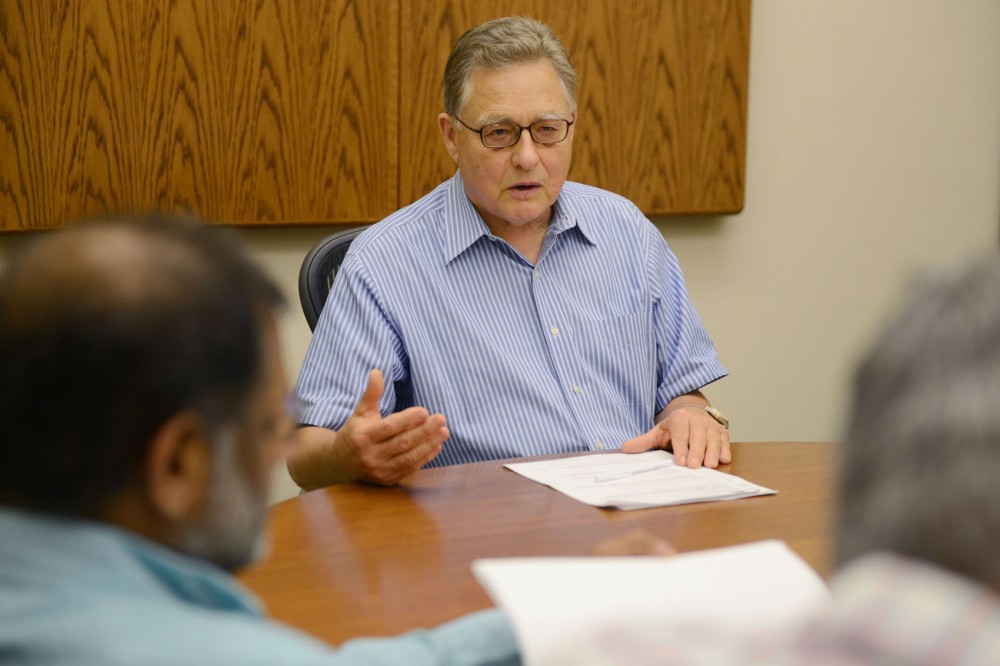This year, the University of Minnesota welcomed two new permanent deans and one interim dean to lead its colleges.
This number of incoming deans is unusual for the University, school leaders say, though the high turnover rate is a trend at large colleges, and its causes vary. And although turnover isn’t a concern among University leadership, the constant changes can affect how colleges run.
Some say because deans don’t typically come to the University planning to be a college’s leader, the position can wear on them after a while, leading them to return to where they started as faculty members or to retire.
But a lot goes into recruiting deans that may not stay at the college for long.
The University spends a lot of time and energy on matching a dean with a college, said Senior Vice President for Academic Affairs and Provost Karen Hanson. In some cases — such as that of recently appointed College of Liberal Arts Dean John Coleman — the school conducts a national search to find the right person for the job.
She said the University reviews all employees every year, and every three years deans are more intensely reviewed to gauge how they’re performing. Hanson said leaders are at-will appointees. If the school doesn’t feel that the dean is doing his or her job as expected, the University can ask them to step down.
Hanson said when someone applies for the dean position, she expects them to stay for at least about three years.
Though the amount of time a dean spends at his or her post can vary, there have been a handful of instances when a dean doesn’t stay for very long.
Sociology professor and Vice Chair of the Faculty Senate’s Faculty Consultative Committee Christopher Uggen has worked under four permanent CLA deans in his 19 years at the college.
He said the average dean doesn’t stay in the position for very long because so much is required of him or her. He said the University looks for those who are able to handle the pressure.
The Medical School saw two deans come and leave during the course of about seven years, and it welcomed a new one in February.
Hanson said deans sometimes have things they want to accomplish as administrators, and once they’ve finished it, they want to return to their work as a faculty member.
“You go into an academic field, and that would have been the first love of any of our deans,” she said, “so there’s always that tug on them.”
Some of the school’s longest-standing leaders started as faculty members, satisfied with doing their research and teaching their students, not expecting to become an administrator. They say they took the job because they saw it as a chance to help improve their college.
With a nationwide search to replace former College of Biological Sciences dean Robert Elde underway, interim dean Thomas Hays said he’s considering putting his application in, but he acknowledged that part of him is a faculty member, even in his administrative role.
“I love my research, [and] I love working with students in the lab,” he said.
In other cases, a dean could be pursued by another university or program.
College of Veterinary Medicine Dean Trevor Ames said the dean before him was asked to be the director of the Animal Medical Center in New York, which prompted him to leave the school.
“As you progress in your role as dean, these opportunities arise and you decide that the time is right for you to make that transition,” he said.
Though he has plans to stay at the University as the school’s dean now, he’s given some thought to what position he would like to end his career in. But he isn’t ready to publicly state it.
Adjusting to a new boss
Like any other boss, a new dean brings his or her own ideas and values to the job. And though those things should align with the college’s mission, there is an adjustment period for those within the college.
CBS biology professor Jane Phillips said in her 24 years at the University, she’s worked under three deans, including Hays.
“It’s the same thing that happens when a new president comes into the University or to the country,” she said. “We adjust.”
She said she recalls going through multiple deans and chancellors at the University of Wisconsin-Madison during her undergraduate and graduate years.
Uggen, the sociology professor, said he notices a shift in CLA whenever there’s a new dean. He said it affects how the faculty and staff members in the college think of their roles because the dean is a representation of the college.
Though improving the college is in their job description, deans are also responsible for overseeing all of a college’s departments, faculty and students.
When a new dean comes in, he or she can be met with the challenge of continuing a past leader’s work while trying to launch their own initiatives.
Steven Crouch has overseen the College of Science and Engineering since 2005. He said his first step as dean was to implement a good administrative team, to which he attributes much of the college’s success.
A few years ago, Crouch said he discovered that the college needed to pay more attention to its undergraduate students, so it began allocating resources toward recruiting better students to increase the college’s graduation rate. He said he doesn’t think this change would have been made if he hadn’t been the dean for so long.
Making changes within a college can be difficult to do for some who are new and have a sharp learning curve, Hanson said.
“Because our colleges are quite complicated, even if one is an internal person there’s a lot to learn when you come out of a department … into the dean’s office,” she said.
And as colleges are in between deans, an interim can sometimes help ease the transition.
The University often pulls interim deans for a permanent job, even when they perform national searches.
The College of Food, Agricultural and Natural Resource Sciences, for example, made interim dean Brian Buhr’s position permanent in May.
Emily Hoover, head of CFANS’ horticultural science department, said that having someone who has held the position before is helpful because he’s already familiar with the college.
“I don’t think that the transition is probably as difficult as it would be as if somebody had come in and you had to explain who you are and what your department does and that kind of stuff,” she said.










